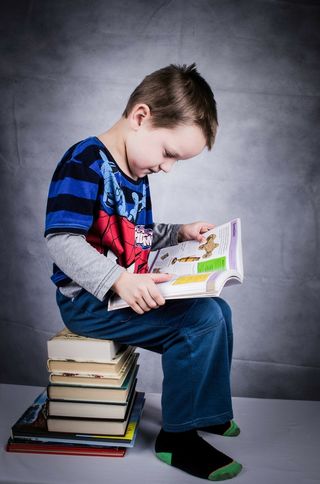Child Development
Why Children Like Repetition, and How It Helps Them Learn
Doing things over and over again might help children learn new things.
Posted July 10, 2019 Reviewed by Gary Drevitch
“Again!” My 4-year-old son Edwin likes to yell over and over again when he finds a new activity or joke that he likes. My 16-month-old, Charlie, likes to repeatedly throw objects on the floor from his high chair or even against the wall if it makes an interesting sound. They both like to hear the same stories every night before bed, they like to eat the same foods for lunch, they like to play with the same toys and watch the same movies every day. When they find something they like, they want to do it over and over and over again.
Why do children like repetition so much? An early developing preference for the familiar is actually quite common in infancy and early childhood. These preferences begin to develop before a baby is even born—in the third trimester of pregnancy. At that point, fetuses can taste, smell, and hear, and as a result, at this time, they begin to develop preferences for familiar flavors from their mother’s food in the amniotic fluid that floats around them (Schaal, Marlier, & Soussignan, 2000; Menella, Jagnow, & Beauchamp, 2001). They also develop preferences for familiar sounds, like the sound of their mothers’ voice (Kisilvesky et al., 2003), their native language (Moon, Cooper, & Fifer, 1993), or even familiar stories that are read to them from outside the womb (DeCasper & Spence, 1986). This trend continues after they’re born, and only after a few hours of exposure, newborns develop a fast preference for their mother’s face (Field, Cohen, Garcia, & Greenberg, 1984). Soon after, they develop preferences for faces in general (Johnson & Morton, 1991), all based on familiarity.
This preference for the familiar might be adaptive—creating an early affinity for the people that are most likely to take care of them.
So perhaps it’s not surprising that children like to read the same books, watch the same movies, and sing the same songs on repeat every day. In fact, there is evidence that this repetition might even support learning.

Not surprisingly, research has shown that children learn better from reading a book over and over again than just reading it once or twice. In one study, researchers presented 3-year-old children with the same new words in three stories over the course of a week. The new words were exactly the same for all children, but half of the children were presented with the words in the same exact story repeated three times, while the others heard the same words in three different stories. Children learned the words better when they heard the same story repeated than when they heard the same words presented in three different stories (Horst, Parsons, & Bryan, 2011).
The same trends have been found for babies. In a similar study, researchers presented 18- to 24-month-olds with a storybook that detailed specific actions needed to make and shake a toy rattle. Infants were read the book either twice or four times, and the researchers found that the more the babies were read the book, the more they imitated the actions they learned (Simcock & DeLoache, 2008). Repeated exposure to actions presented on television also leads to more frequent imitation (Barr, Muentener, Garcia, Fujimoto, & Chavez, 2007).
People often say that practice makes perfect. Research certainly supports this, especially in children. In fact, studies have shown that repetition can be critically important for learning in general (e.g., Karpicke & Roediger, 2008)—especially for memory (Hintzman, 1976) and language learning (Schwab & Lew-Williams, 2016). So while adults can easily pick up new information from a single exposure, when kids ask to watch the same movie they’ve already seen a hundred times or read the same book before bed for the 10th night in a row, it might just be their way of learning the storyline. And although it might be boring or even annoying to do the same thing over and over and over (and over and over) again, this extra practice might be just what children need to learn new things.
References
Barr, R., Muentener, P., Garcia, A., Fujimoto, M., & Chávez, V. (2007). The effect of repetition on imitation from television during infancy. Developmental Psychobiology, 49(2), 196-207.
DeCasper, A. J., & Spence, M. J. (1986). Prenatal maternal speech influences newborns’ perception of speech sounds. Infant Behavior and Development, 9, 133-150.
Field, T. M., Cohen, D., Garcia, R., & Greenberg, R. (1984). Mother-stranger face discrimination by the newborn. Infant Behavior and development, 7(1), 19-25.
Hintzman, D. L. (1976). Repetition and memory. In Psychology of learning and motivation (Vol. 10, pp. 47-91). Academic Press.
Horst, J. S., Parsons, K. L., & Bryan, N. M. (2011). Get the story straight: Contextual repetition promotes word learning from storybooks. Frontiers in Psychology, 2, 17.
Johnson, M. H., & Morton, J. (1991). Biology and cognitive development: The case of face recognition. Oxford, England: Basil Blackwell.
Karpicke, J. D., & Roediger, H. L. (2008). The critical importance of retrieval for learning. Science, 319(5865), 966-968.
Kisilevsky, B. S., Hains, S. M. J., Lee. K., Xie, X., Huang, H., Ye, H. H., Zhang, K., & Wang, Z. (2003). Effects of experience on voice recognition. Psychological Science, 14, 220-224.
Mennella, J. A., Jagnow, C. P., & Beauchamp, G. K. (2001). Prenatal and postnatal flavor learning by human infants. Pediatrics, 107(6), E88.
Moon, C., Cooper, R. P., & Fifer, W. P. (1993). Two-day-olds prefer their native language. Infant behavior and development, 16, 495-500.
Schaal, B., Marlier, L., & Soussignan, R. (2000). Human fetuses learn odours from their pregnant mother’s diet. Chemical Senses, 25, 729-737.
Schwab, J. F., & Lew-Williams, C. (2016). Repetition across successive sentences facilitates young children’s word learning. Developmental Psychology, 52(6), 879-886.
Simcock, G., & DeLoache, J. S. (2008). The effect of repetition on infants' imitation from picture books varying in iconicity. Infancy, 13(6), 687-697.


